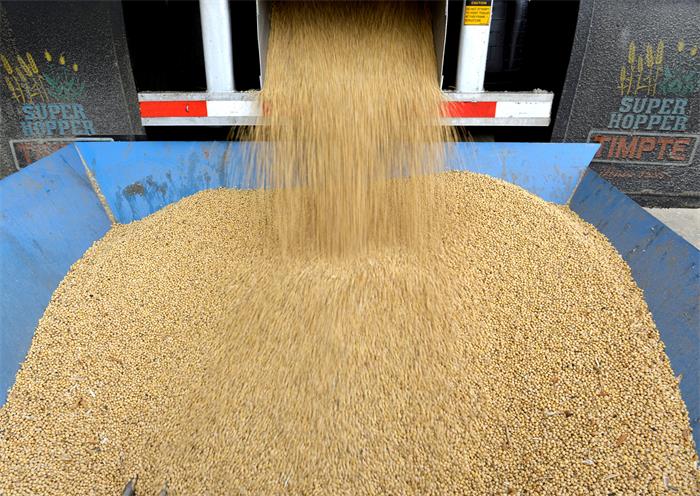Tariffs to backfire, experts warn US


Actions 'make it more difficult' to sell 'Made in America' products
US President Donald Trump's decision to impose new tariffs on selected Chinese products and restrict imports will inflate consumer prices and slow global economic growth, which has benefited from the multilateral trading system, experts and officials said.
The United States on Friday announced additional tariffs of 25 percent on Chinese imports worth approximately $50 billion, including aerospace, robotics, machinery, new materials and automobiles, destroying the consensus reached in previous talks.
To ensure its rights, China will implement an additional 25 percent tariff on 659 goods worth $50 billion from the US, the Customs Tariff Commission of the State Council announced on Saturday.
Tariffs on 545 US goods, valued at $34 billion, including agricultural products, autos and aquatic goods, will take effect on July 6. Tariffs on 114 other items, including chemical products, medical equipment and energy products, will be announced at a later date, the commission said in a statement.
Wang Chen, vice-chairman of the Standing Committee of the National People's Congress, expressed the hope in Washington that the US would treat China-US relations from the perspective of the strategic and overall picture and properly manage sensitive issues and differences. Wang visited the US from June 13 to 16 at the invitation of the US Congress.
Louis Kuijs, head of Asian economics at the Oxford Economics think tank, said the economic impact of the US tariffs will cause growing uncertainty and risks affecting business confidence and investment, especially cross-border investment.
"Thus, there will be an impact on growth in China, the US and elsewhere, at a sensitive time for the global economy," Kuijs said.
The US, meanwhile, is also busy arguing with traditional allies such as the European Union, Canada and Mexico in a separate dispute over steel and aluminum.
Zhang Zhiwei, chief China economist at Deutsche Bank, said a trade war may put US multinationals in danger. The current policy discussion focuses on trade, while the role of multinationals through foreign direct investment is often overlooked. Their operations in other countries help boost the US economy and employment.
"The US ran a trade deficit of $0.5 trillion against the rest of the world in 2017, but once we count in the overseas sales of these multinationals, the US has a surplus of $0.9 trillion," Zhang said.
Zhang said US multinationals accounted for one-fifth of total employment in the country. The US unemployment rate is lower than its major trading partners to some extent because of the success of the US multinationals. The threat of a trade war may put their success at risk.
US Chamber of Commerce President and CEO Thomas J. Donohue said imposing tariffs places the cost "squarely on the shoulders" of consumers, manufacturers, farmers and ranchers in the US.
"This is not the right approach," Donohue said in a statement.
The US National Retail Federation said the new tariffs and China's ensuing retaliatory moves threaten to erode economic gains in the US.
"Tax reform has increased the paychecks of American workers, encouraged US companies to expand and invest in their workforces, and unleashed the strongest levels of consumer confidence in a generation. Unfortunately, these tariffs and the retaliation China has promised put all this economic progress at risk," federation President and CEO Matthew Shay said.
Kevin Brady, US House Ways and Means Committee chairman, said: "These tariffs make it more difficult to sell more 'Made in America' products globally and expose many of our industries — particularly agriculture and chemicals — to devastating retaliation."
Wei Jianguo, a former vice-minister of commerce, said China's response is a precise strike and a severe blow to the US. All economic and trade agreements in the areas of energy and agriculture reached in previous talks will fail to take effect due to the US's latest unilateral move, Wei said.
"China must aim at the US's weakest points to make the strike as US 'fight and talk' trade policies with China will continue in the long run," he said.
"The deterioration of trade ties between the two economies will derail US economic growth," Wei said. "The earlier achievements of the Trump administration in terms of employment and taxation policy will be cast away. All these factors will be beyond the US's expectations."
Leo Chan, executive director of the Greater Cincinnati Chinese Chamber of Commerce, said the escalating trade tensions between China and the US are bad for both sides.
“It's hurting our community and we have already seen plummeted sales in certain area especially in the agriculture sector. The collateral damages may be worse and may show the impacts for months or even years to come, especially when foreign direct investments (FDI) are concerned,” Chan said.
He said the organization is organizing a trade mission to China to attend the China International Import Expo in November.
“We are happy to see that China is making efforts to further open up its market and import more from the US,” Chan said. “We hope more businesses from the US could join us to showcase the products and services we can offer to the Chinese consumers.”
Chi Wang, president of the US China Policy Foundation, said if the trade war continues to escalate, the damage will be felt by both sides.
“This is not the way forward. Both the US and China need to keep communication open and strive for negotiation and compromise. If the two sides refuse to talk, the mistrust and economic consequences faced will only get worse,” Wang said.
Zhang Yuan in New York and Dong Leshuo in Washington contributed to this story. Li Xiang, Chen Jia and Jing Shuiyu in Beijing contributed to this story.
Contact the writers at zhongnan@chinadaily.com.cn




































